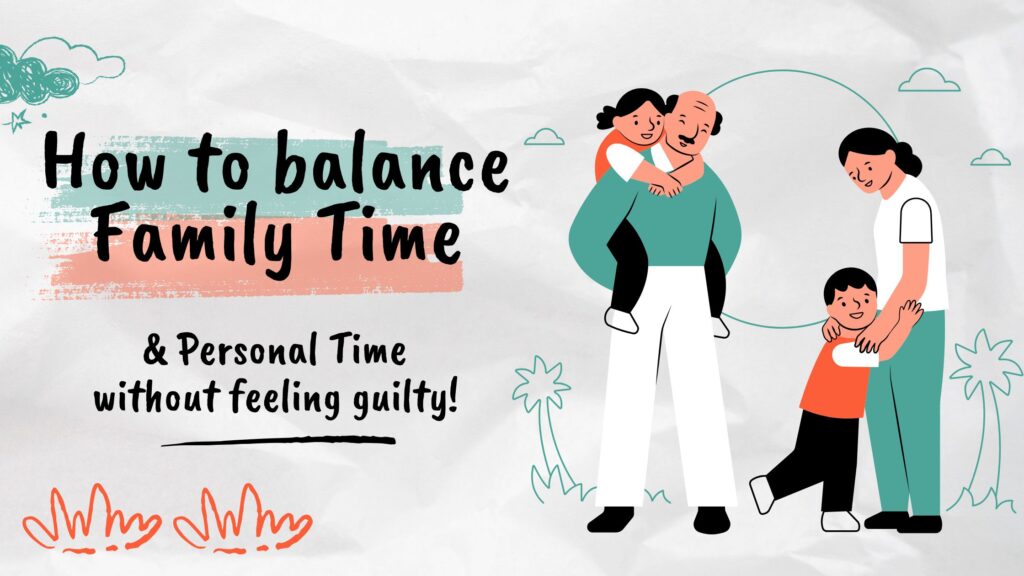How to Balance Family Life and Personal Time Without Feeling Guilty

If you are a parent, partner, or caregiver, you probably feel the pressure to balance family responsibilities with the need for personal time.
It’s easy to feel like you are constantly sacrificing your own needs for the sake of others. But honestly, you cannot pour from an empty cup.
Balancing family life and personal time is essential, not only for your well-being but also for the well-being of your loved ones. You’re more equipped to care for others when you’re in a better mental and emotional space.
In this blog, we will explore how to balance family and stop feeling guilty for taking time for yourself.
Ways to Balance Family & Personal Time without Feeling Guilty
1. Understand That You Deserve Personal Time
Many people feel guilty about wanting personal time because they worry it means they are neglecting their families. However, taking time for yourself is not selfish; it’s necessary for your mental, emotional, and physical health.
- Why it matters: When you take care of yourself, you are better able to care for your family. Personal time can be the recharge you need to be more present and loving. Taking breaks can reduce burnout, increase your patience, and improve your overall mood.
- Self-care is essential: Whether it’s 10 minutes of quiet time with a book or a full day off to do something you love, this time is crucial to your happiness and well-being. You’re not being selfish; you’re ensuring that you are your best self for your family.
Remember: You deserve to feel recharged, so don’t let guilt get in the way.
2. Set Boundaries with Family and Friends
To create a healthier balance, it’s important to set boundaries around your time. This can be challenging, especially when you feel like there’s always something that needs to be done.
But boundaries help ensure you maintain your sense of identity and don’t lose yourself in constant caregiving.
- Communicate openly: Let your family know when you need personal time. Be clear and direct about your needs without feeling like you have to justify them. A simple, “I need some alone time today to recharge,” can go a long way.
- Set limits on non-essential tasks: It’s easy to overcommit to family events or tasks, but you don’t have to say yes to everything. Learn how to decline invitations that might interfere with your time politely. This will help you maintain your boundaries without feeling overwhelmed.
Boundaries create respect and understanding, allowing you to recharge without guilt.
3. Prioritize Your Time: What’s Important?
When you’re juggling multiple responsibilities, it’s easy to feel overwhelmed. One way to manage this is by prioritizing your time. Ask yourself: What is most important right now?
- Create a schedule: Organizing your week can help you visualize when you have time for yourself and when you need to be with your family. Block out moments of personal time the same way you would for appointments or family activities.
- Focus on quality, not quantity: It’s not about how much time you have, but how you use it. Whether it’s 30 minutes of meditation or a quick walk, focus on making the most of the time you carve out for yourself. Don’t feel like you need an entire afternoon; small moments can be just as rejuvenating.
When you prioritize your needs, you will feel more in control and less overwhelmed.
4. Involve Your Family in Your Self-Care Routine
You don’t always have to do self-care alone. Sometimes, involving your family in your self-care can create a healthier balance and help everyone feel included.
- Shared activities: If you enjoy fitness, take a walk or do a home workout together. If you like reading, spend some time reading to your kids. These activities can still be enjoyable for you while helping your family bond.
- Teaching self-care: When you model self-care for your family, it shows them that it’s okay to take time for themselves, too. This can create a more balanced household and reduce stress for everyone. For instance, teach your children the importance of alone time and allow them to have their own personal space as well.
Self-care can be both personal and shared, depending on how you structure your time.
5. Be Flexible and Kind to Yourself
The reality of balancing family and personal time is that things won’t always go according to plan. Life happens – there will be days when you feel like you’ve failed to balance everything.
- Be flexible: Understand that sometimes personal time may need to be adjusted. It’s okay if things don’t always go smoothly. If the family needs your attention, allow yourself to adjust without guilt.
- Practice self-compassion: If you don’t get that hour to yourself because of an unexpected family situation, don’t beat yourself up. Acknowledge the challenge and move on. You are doing your best, and that’s enough. Remember, you are only human, and it’s okay to adjust.
The goal is to try your best, not to be perfect. Give yourself grace, and trust that you are doing a great job.
6. Make the Most of Small Moments
Not every personal moment has to be long or elaborate. Sometimes, it’s the small moments that can make all the difference.
- Take breaks throughout the day: If you can’t get away for a long period, take short breaks. Even a five-minute breather can help you clear your mind and feel rejuvenated. Take a deep breath, stretch, or listen to a favorite song.
- Use moments of solitude: When you’re alone, even if it’s just for a few minutes, use that time to breathe, stretch, or reflect. These moments can make you feel refreshed and help you refocus.
Even small moments of self-care are important in the grand scheme of your overall well-being.
Conclusion: Achieving a Healthy Balance Takes Time
You cannot balance family and personal life overnight, and it requires practice. But with the right mindset, boundaries, and self-compassion, it is possible to find family balance that works for you and them.
Remember, you are not a bad parent, partner, or caregiver for taking time for yourself. It’s essential. So take a deep breath, set your boundaries, and permit yourself to enjoy those moments of personal time without guilt because your well-being matters.






